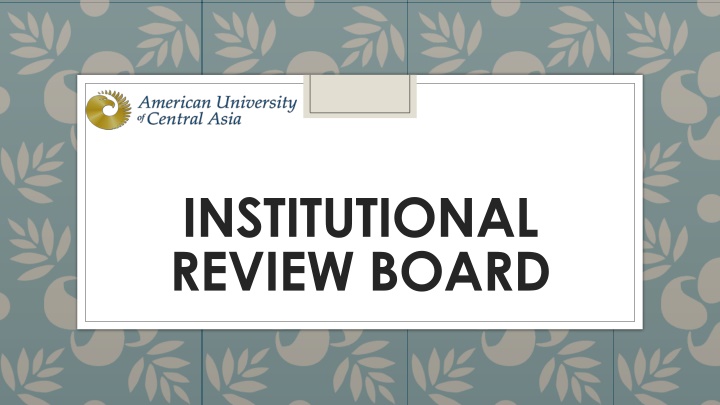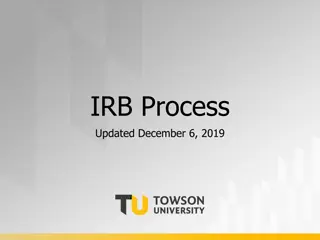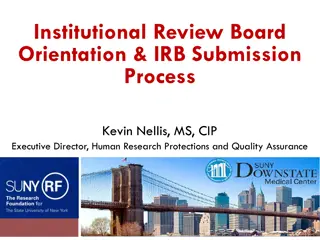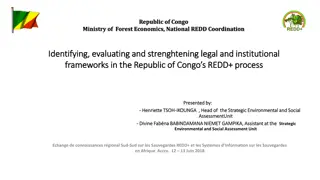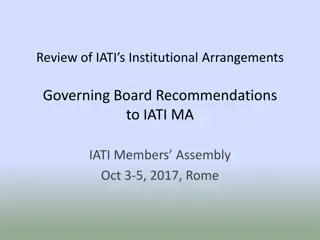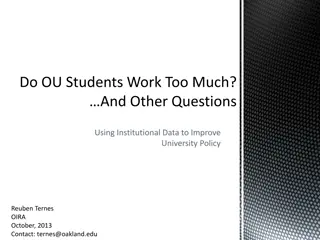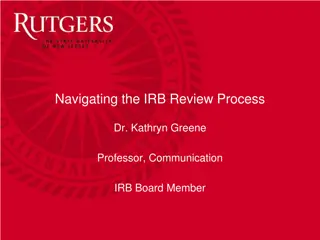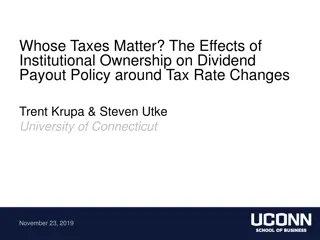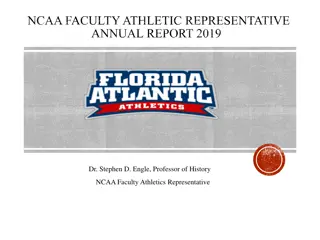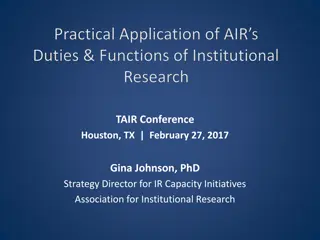Institutional Review Board
The Institutional Review Board (IRB) at AUCA plays a vital role in reviewing and approving research projects involving human subjects to ensure ethical standards are met. This includes obtaining informed consent, protecting privacy, and following international guidelines. Research must contribute to generalizable knowledge while respecting the rights and welfare of participants. The Belmont Report outlines key ethical principles guiding research involving human subjects.
Download Presentation

Please find below an Image/Link to download the presentation.
The content on the website is provided AS IS for your information and personal use only. It may not be sold, licensed, or shared on other websites without obtaining consent from the author.If you encounter any issues during the download, it is possible that the publisher has removed the file from their server.
You are allowed to download the files provided on this website for personal or commercial use, subject to the condition that they are used lawfully. All files are the property of their respective owners.
The content on the website is provided AS IS for your information and personal use only. It may not be sold, licensed, or shared on other websites without obtaining consent from the author.
E N D
Presentation Transcript
INSTITUTIONAL REVIEW BOARD
Institutional Review Board (IRB) is an AUCA Faculty Senate Committee that is responsible for conducting review and clearance of all research projects within the AUCA that entail collecting data from human subjects. In its proceedings, IRB is guided by general principles of ethics in research and internationally recognized documents. Purpose: To determine if the rights and welfare of human subjects in research are adequately protected.
What is Research? Research is a systematic investigation designed to develop or contribute to generalizable knowledge via dissemination of results, such as publications or conferences. E.g. of methods: interviews, surveys, observation, case studies, analysis of existing data, etc. Note: IRB approval must be obtained for all theses and dissertation research even if there is no intention to publish or disseminate the results.
Who are Human Subjects? Human subjects (or human participants) - living individuals about whom an investigator obtains: Data through intervention or interaction with the individual or Identifiable private information
Identifiable private information Includes: contact details, name, last name, address, and other personal details which can lead to identification of the person by third parties. In some cases, personal sensitive data includes voice and appearance of the respondent which are collected while audio or video recording.
Belmont Report The National Commission for the Protection of Human Subjects of Biomedical and Behavioral Research, 1976, USA. https://www.hhs.gov/ohrp/regulations-and- policy/belmont-report/index.html The Belmont Report identifies three basic ethical principles for conducting research that involve human subjects: 1) Respect for persons 2) Beneficence 3) Justice
Respect for Persons Respect for persons is a principle of ethics which involves recognition of the personal dignity and autonomy (i.e., right to choose) of individuals, and special protection of those persons with diminished autonomy. This principle requires obtaining informed consent from all potential research subjects (or their legally authorized representatives). Participants have the right to control the information about themselves (i.e., privacy). No coercion.
Informed Consent Informed consent is the process of explanation of the study (in everyday language) for potential participants, we all we the form participants sign: Gives information about the procedures, potential risks and benefits to ensure people participate voluntarily. Informed consent is a must for all studies, unless there is a valid justification for the informed consent waiver. Anonymous surveys may not require signed informed consent, but information with all the elements of informed consent should be provided to participants.
Vulnerable Populations Vulnerable populations involve human subjects considered particularly susceptible to coercion or undue influence in a research setting. Individuals within vulnerable populations may have limited autonomy, may be incapable of understanding what it means to participate in research and/or may not understand what constitutes informed consent. E.g.: children, cognitively impaired, prisoners, pregnant women and fetuses, students of the professor conducting research, etc. Researchers must provide justification for the use of vulnerable populations within research.
Beneficence Beneficence requires that researchers protect persons from harm by maximizing anticipated benefits and minimizing possible risks of harm. Research-related risks must be reasonable in light of expected benefits. Risk - a combination of the probability of experiencing a harm and the severity of the envisioned harm. Benefit - something of positive value related to health or welfare of the subject. (Benefit does not include the monetary compensation for participation!)
Justice Justice requires that the benefits and risks of research be distributed fairly. Subject selection principles must be justified both scientifically and ethically. Different groups should be treated fairly. In other words, it is important to determine whether certain social classes or groups of people are not unjustly targeted for research, for example, because of ease of recruitment.
All AUCA faculty, staff and students who conduct research involving human subjects are required to have approval from the IRB PRIOR to start of data collection. Contacting your participants also qualifies as data collection.
A project DOES NOT require an IRB clearance if: No data is collected about or from human subjects (e.g., animals and weather). Uses anonymized secondary or archival data (for which consent has been taken before) There is no intent to publish the results in the form of conference presentations, thesis defense, journal or conference publications, whitepapers, or public opinion posts. Data is collected from human subjects in commonly accepted educational settings and involve standard educational practices (for example, data collected to illustrate a concept in a class). Data is collected from human subjects for purposes of learning a data-collection method (student class project). All other research projects involving human subjects assuming future publication or dissemination of findings need IRB clearance. Student dissertations and senior theses need IRB clearance.
How to Apply? Applications are completed and submitted electronically via the IRB Engine (https://review-irb.auca.kg/en/login). To register in the system, you have to: 1. Study IRB manual 2. Take an exam To learn more about the application process, please visit https://auca.kg/en/res_irb_inst/.
Types of Review Exempt from Full Review Expedited Review Full Board Review To learn more about review types, please visit: https://auca.kg/en/res_irb_rev/.
Exempt from Full Review Research poses no more than Minimal Risk to participants. Risk can be the result of collecting data from vulnerable populations or exposing participants to situations which might lead to stress due to the topics of discussion or questions or the context. Minimal Risk means facing no more stress during a research and in everyday life. Research involves ordinary educational settings and normal educational practices. Anonymous tests, surveys, or public observations. Research uses existing public or anonymous data or specimens, where all data is originally de-identified. Exempt from Full Review applications are accepted on a rolling basis (with no deadlines).
Expedited Review Research activities present no more than Minimal Risk to participants, just like Exempt from Review type. Collection of data from voice, video, digital, or image recordings made for research purposes. Research on individual or group characteristics/behavior, surveys, interviews, focus groups or oral histories that are confidential, but not anonymous. Expedited Review applications are accepted on a rolling basis (with no deadlines).
Full Board Review Any research that involves more than Minimal Risk to participants. Risk can be the result of collecting data from vulnerable populations or exposing participants to situations which might lead to stress due to the topics of discussion or questions or the context. Principal Investigator (PI) must complete and submit application for Full IRB Review is conducted according to the deadlines on IRB website (https://auca.kg/en/res_irb_impdates/ ).
Review time The length of time for review depends on a number of factors: The category of review is required: Exempt & Expedited: 14 business days for review after application submission. Full Board: 14 business days for review after each submission deadline. The completeness of an application.
AMERICAN UNIVERSITY OF CENTRAL ASIA, INSTITUTIONAL REVIEW BOARD Address: 7/6 Aaly Tokombaev str., Bishkek, 720060, Kyrgyz Republic CONTACTS TEL: +996 (312) 915 000 FAX: +996 (312) 915 028 Website: https://irb.auca.kg/ Email: irb@auca.kg
